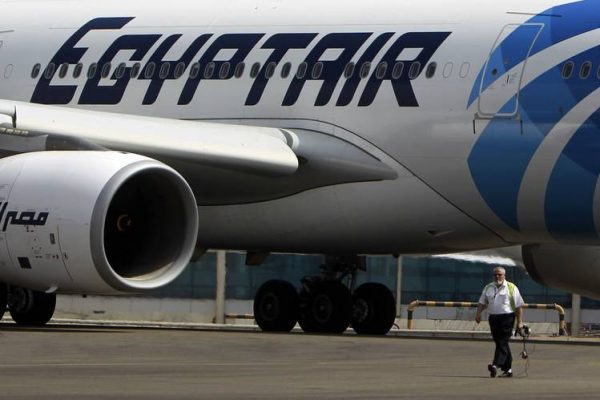 The search for EgyptAir Flight 804 continues, amid contradicting reports about the aircraft’s final moments.
The search for EgyptAir Flight 804 continues, amid contradicting reports about the aircraft’s final moments.
After it disappeared en route from Paris to Cairo last week, some debris from the plane — including life vests, personal belongings and parts of wreckage — has been recovered.
Small fragments of human remains have also been found, and officials in the Egyptian capital are trying to identify and match them to victims. Families of the victims have nearly completed giving DNA samples to help with the grim task, EgyptAir’s vice chairman Ahmed Adel told CNN on Tuesday.
But it remains too early to determine from examining the remains whether or not there was an explosion on the flight, an official at the morgue told CNN.
Adel said that media reports suggesting otherwise were “all speculation.”
“Any high velocity impact leads to defragmentations, and this is not indicative of what caused the accident,” he said. “Let’s not jump to conclusions.”
A key focus of the search is for the plane’s fuselage and the critical black boxes, which are expected to provide vital clues about what happened to the aircraft. Adel said EgyptAir had no information about the location of the fuselage, and that the multinational search team was focusing on an area “about the size of Connecticut.”
Swerve or no swerve?
At the heart of the confusion over the final moments of the flight are conflicting reports from Greek and Egyptian authorities.
The flight was at 37,000 feet when it lost contact above the Mediterranean early on May 19, shortly before the aircraft was scheduled to exit Greek airspace and enter Egyptian airspace.
Initially, Greek Defense Minister Panos Kammenos said that, upon entering Egyptian airspace, the aircraft swerved “90 degrees left and then 360 degrees” before plunging dramatically.
The head of Egypt’s National Air Navigation Services Company is challenging that account. Administrative board chairman Mohi El-Din Azmi told Egyptian state-run media Al-Ahram on Sunday that the plane did not swerve or lose altitude before it disappeared off the radar.
Asked Tuesday about the conflicting accounts, Adel said that “the decisive information is going to come from the black boxes, and they have not been retrieved yet.”
Time is working against the investigators — as is the scope of the search area, with teams searching in waters as much as 10,000 feet deep. Egyptian and French submersibles are working in the area, in an attempt to find the flight data and cockpit voice recorders before their transponder batteries expire.
“The investigators are up against the clock,” said aviation analyst Justin Green. “If they don’t find the black boxes in the next 30 days the job of finding them is going to be much harder because the black boxes may no longer be sending out a sonar ping which will help them identify it.”
French families voice concerns
A representative of an organization devoted to families of French passengers said relatives aren’t sure they can trust the Egyptian investigation and want more involvement from France.
Stephane Gicquel, secretary general of the French National Federation of the Victims of Catastrophes, said “there will be a way to track the investigation put in place by the French government with an appointed official to defend the interests of the families in the weeks and years to come.”
Gicquel said the families are distrustful of Egypt, in part due to how the country “cooperated very badly with the French authorities” during the investigation of the 2004 crash of a jet carrying mostly French tourists taking off from the resort town of Sharm el-Sheikh.
Egyptian government and airline officials have promised to be transparent in the investigation into what happened to the plane.
The Egyptian Civil Aviation Ministry investigative committee is being led by Ayman al-Moqadem, the investigator also in charge of the inquiry into the October crash of a Russian Metrojet airliner over Sinai. That disaster, which killed all 224 aboard, is widely believed to be the work of terrorists.
A preliminary report of the investigation will be available within a month, Moqadem told state media Sunday.
Smoke detected
On Saturday, French aviation officials revealed that an automated system aboard the plane sent messages about smoke in the front of the aircraft just before it crashed into the sea early Thursday en route from Paris to Cairo.
France’s revelation confirmed flight data that CNN obtained from an Egyptian source. That technical data — transmitted through Aircraft Communications Addressing and Reporting System, or ACARS, which sends messages between planes and ground facilities — shows the plane transmitted 11 electronic messages after it departed Paris.
The first two messages showed engines were functional, but the next message at 00:26 GMT stated a rise in the co-pilot window temperature and sent out messages of smoke in locations such as the lavatory and avionics compartment below the cockpit. The alerts continued until the plane vanished from radar screens.
A screen grab of data has time stamps that match the approximate time the aircraft went missing, although aviation experts cautioned the alerts don’t necessarily mean a fire occurred on the Airbus A320 or that the crew even knew about the alerts, which are automatically transmitted.
There have been electrical problems with window anti-ice heaters in A320s. In 2003, the Federal Aviation Administration required windshields replaced in all A320s in the United States. It’s not known whether Egypt followed the FAA directive.
Before takeoff on the night of May 18, one of the pilots signed a technical log asserting that the plane was in normal condition, with no technical issues, Al-Ahram reported. The Egyptian outlet published images of the log; the details are in line with French authorities’ assertion that the plane had passed inspection before takeoff.
The theories
With little physical evidence, the possibilities about what happened to the plane remain wide open, from a bomb to a mechanical malfunction to pilot error or even an intentional crash.
No group has claimed responsibility for taking down the jet, and as of now, investigators have found nothing implicating the flight crew or security officials aboard the plane, an Egyptian official said.
Checks of the passenger manifest have so far resulted in no hits on terror watch lists, officials with knowledge of the investigation said.
The jet had routine maintenance checks in Cairo before it left for Paris, the airline said. Earlier Wednesday, the jet was also in Eritrea and Tunisia, data from flight-tracking websites show.
CNN

Leave a Reply
You must be logged in to post a comment.